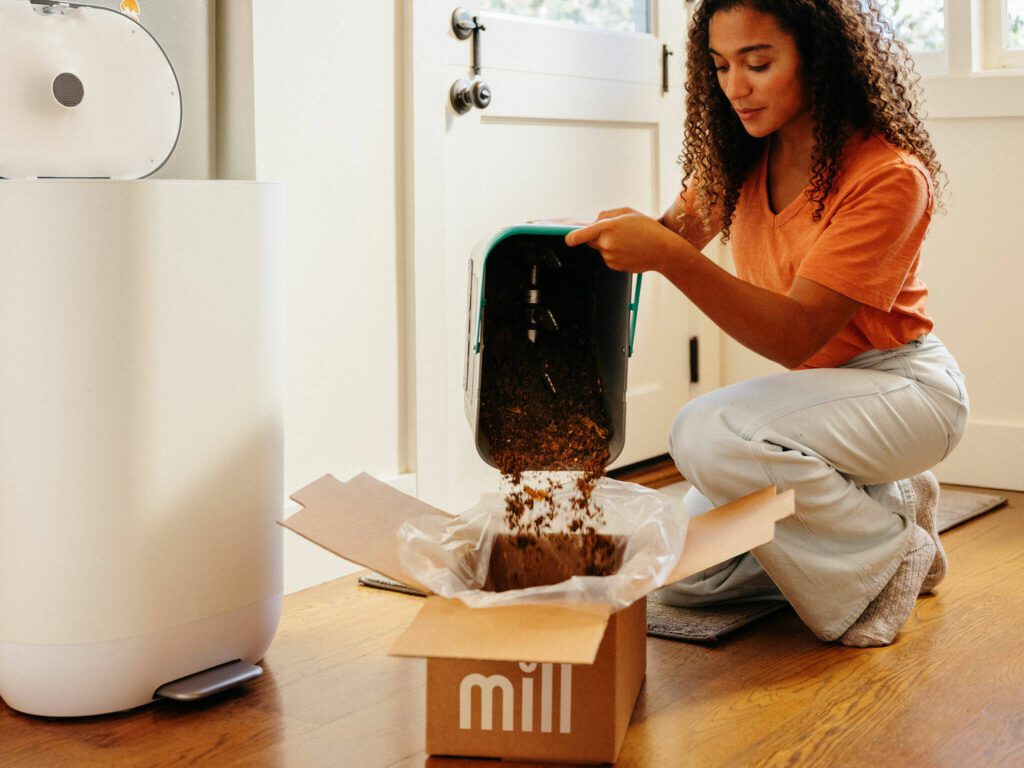MUKILTEO — Burnt casserole, chunks of carrot cake, the guacamole that went bad — this company wants to turn your food scraps into chicken feed.
Mill, a San Bruno, California-based company, has opened a research and development center in Mukilteo to produce commercial chicken feed.
The facility will serve customers across the U.S., said Geoff Hill, director of feed, research and development and production at the Mukilteo site.
Landfills brim with uneaten food, Hill said. The start-up hopes to take bite out of that volume.
Each year, Americans waste 119 billion tons of food, according to Feeding America, a nonprofit aimed at ending hunger.
Worse, rotting food produces methane, a greenhouse gas that’s 80 times more potent than carbon dioxide over a 20 year period, the company said.
“If food waste was a country, it would be the third-largest greenhouse gas emitter, behind China and the United States,” Hill said, citing the findings of Project Drawdown, a nonprofit climate resource group.
Hill offered a profile of Mill and its choice of Mukilteo at an Economic Alliance Snohomish County’s gathering this spring at the Tulalip Resort Casino.
“Snohomish County’s rich history of technological and agricultural innovation — coupled with the state of Washington’s forward-thinking climate regulations — made Mukilteo a natural home for Mill’s first food-to-feed facility,” Hill said.
For years, large-scale commercial feed producers have collected food waste from restaurants and grocery stores and turned it into chicken feed. The process involves steaming, grinding and drying the scraps.
Mill has developed a small-scale system that gives households the opportunity to do the same.
The company is currently seeking federal and state approval to sell its commercial chicken chow, Hill said.
“We’re working through the necessary scientific and regulatory processes to establish a safe and nutritious chicken feed ingredient we can distribute commercially,” the company said.
Founded in 2020 by Matt Rogers and Harry Tannenbaum, the duo worked at Nest, a developer of smart home products. Rogers is Mill’s CEO and Tannenbaum its president.
Here’s how it works:
Customers pay about $1 a day for the subscription service, which includes an app to track the process.
Essentially, they’re leasing an electric Mill bin, about the size of a kitchen trash can.
Homeowners toss their leftovers into the bin, which is programmed to dry, shrink and deodorize the contents each day.
The bin also grinds the food, reducing its volume and producing what the company calls “food grounds” — nutrient-rich, sawdust-colored pellets.
“Food Grounds are food, minus the water, bulk, odor, and ick” factor, the company said.
The device can collect food scraps for several weeks without having to be emptied. And there’s little or no smell, Hill said.
When full, you empty the dried food grounds into a prepaid shipping box addressed to Mill. Shipping is included in the membership price.
Most household shipments average about 10 pounds. About 25 pounds of its food grounds can feed an egg-laying hen for a year, the company said.
It’s not composting, the process that recycles organic matter, such as leaves and food scraps, into fertilizer, Hill said.
The bin can process foods such as dairy, oil and meat that don’t belong in a compost bin.
Changing the way people think about food waste — “it’s not waste” — is the first step, Hill said.
Once the scraps are processed, they acquire new value as livestock feed, Hill said.
A Mill membership can reduce a household’s greenhouse emissions by a half ton, the company estimates.
Mill recently partnered with the city of Tacoma. Residents who opt for a Mill subscription can save $25 a month on their garbage bill, the company said.
The business, Hill says, is a recipe for success.
In taste tests with his backyard chickens, four pullets and two older hens Snowy and Crowy, the flock gave the mix a hearty thumbs up, he said.
“These are beautiful chickens with feathery feet,” Hill said of his test hens. “They seem to really love this stuff.”
For more information about Mill go to mill.com
Janice Podsada: 425-339-3097; jpodsada@heraldnet.com;
Talk to us
> Give us your news tips.
> Send us a letter to the editor.
> More Herald contact information.


























